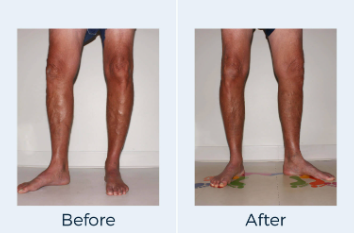By : Geraldus Sigap

What Are Varicose Veins?
Varicose veins are enlarged veins, usually in the legs, caused by weakened vein valves. When the valves don’t function properly, blood doesn’t flow back to the heart efficiently and pools in the veins.
Common symptoms include:
- Heaviness or aching in the legs, especially after prolonged standing
- Swelling around the ankles
- Night cramps
- Bulging, bluish-purple veins
- Itching or skin discoloration around the affected veins
What Is RFA (Radiofrequency Ablation)?
Radiofrequency Ablation (RFA) is a non-surgical procedure that uses radiofrequency energy to generate heat and seal off problematic veins from the inside. A thin catheter is inserted into the affected vein, and controlled heat is used to close the vein, which is then gradually absorbed by the body. RFA has an initial success rate of between 95–98%, and in the long term (5 years), its success rate remains high at 90–95%, which is significantly better than traditional vein stripping procedures.
Once the vein is closed, blood naturally reroutes through healthier veins, improving circulation and reducing varicose symptoms.
Advantages of RFA Compared to Conventional Varicose Vein Surgery
Compared to traditional surgery, RFA offers several benefits, including:
- No large incisions, only a small puncture needed
- General anesthesia
- Minimal pain after the procedure
- Very low risk of bleeding or infection
- Quick recovery, most patients resume normal activity within 1–2 days
- Better cosmetic results, no noticeable scarring
How Is the RFA Procedure Performed?
The RFA procedure typically takes 30–60 minutes and is performed in an outpatient setting. Steps include:
- Ultrasound examination to map the damaged veins
- Local anesthesia applied to the treatment area
- RFA catheter insertion into the vein via a small puncture
- Radiofrequency energy delivered to close the vein
The leg is wrapped or fitted with compression stockings, and the patient can walk out shortly after
Who Is a Good Candidate for RFA?
RFA is suitable for patients with mild to severe varicose veins, especially those involving the saphenous vein. However, it must be discussed with a doctor first, particularly if the patient:
- Pregnancy
- Has a blood clotting disorder
- Has a skin infection in the treatment area
Is RFA Safe?
Yes, RFA is a safe and effective procedure with a high success rate. Possible side effects are generally mild, such as bruising, mild soreness, or swelling at the treatment site, which usually resolve within a few days.

Figure 1. Varices before-after radiofrequency ablation
Recovery After RFA
Recovery after an RFA procedure is generally quick. Most patients can walk and resume light activities on the same day. Doctors typically recommend:
- Wearing compression stockings for 1–2 weeks
- Avoiding prolonged standing or sitting during the first few days
- Refraining from strenuous activities temporarily
When Should You See a Doctor?
Consult a doctor immediately if you experience:
- Bulging, twisted veins in the legs
- Leg pain or heaviness, especially in the afternoon or evening
- Persistent leg swelling that doesn’t improve
- Skin discoloration or slow-healing wounds around the veins
Get the Best Varicose Vein Treatment
If you’re looking for a comfortable, effective, and low-pain solution for varicose veins, RS Abdi Waluyo is here to help. Our medical team uses the latest technology, including Radiofrequency Ablation (RFA), to help you return to an active life without discomfort. Contact us at 021-3144989 or book an appointment online for further consultation.
FAQ
What is RFA for varicose veins?
Radiofrequency Ablation (RFA) is a minimally invasive medical procedure that uses heat from radiofrequency waves to close enlarged veins caused by varicose veins.
Is RFA safe?
Yes. RFA is proven to be safe with a high success rate. Mild side effects such as bruising or localized pain usually subside within a few days.
What are the advantages of RFA compared to varicose vein surgery?
RFA does not require large incisions, causes minimal pain, offers a quick recovery time, and provides better cosmetic results as it leaves no noticeable scarring.
How long is the recovery time after RFA?
Most patients can walk immediately after the procedure and return to light activities within 1–2 days.
Who is a good candidate for RFA?
RFA is suitable for patients with moderate to severe varicose veins, especially involving the saphenous vein, and who do not have active skin infections or blood clotting disorders.
Does RFA leave scars?
No. Since the procedure only involves a small puncture, RFA does not leave scars like conventional surgery.
Resource :
- Chokkalingam Mani B, Delgado GA. Varicose Vein Treatment: Radiofrequency Ablation Therapy [Homepage on the Internet]. In: StatPearls. Treasure Island (FL): StatPearls Publishing, 2025 [cited 2025 May 23]; Available from: http://www.ncbi.nlm.nih.gov/books/NBK556120/
- Poder TG, Fisette J-F, Bédard SK, Despatis M-A. Is radiofrequency ablation of varicose veins a valuable option? A systematic review of the literature with a cost analysis. Can J Surg 2018;61(2):128–138.
- American Vein & Vascular Institute. Before & After Photo Gallery – Vein and Vascular Treatment [Internet]. American Vein; [cited 2025 May 29]. Available from: https://americanvein.com/vein-and-vascular-treatment-before-and-after-photo-gallery/
